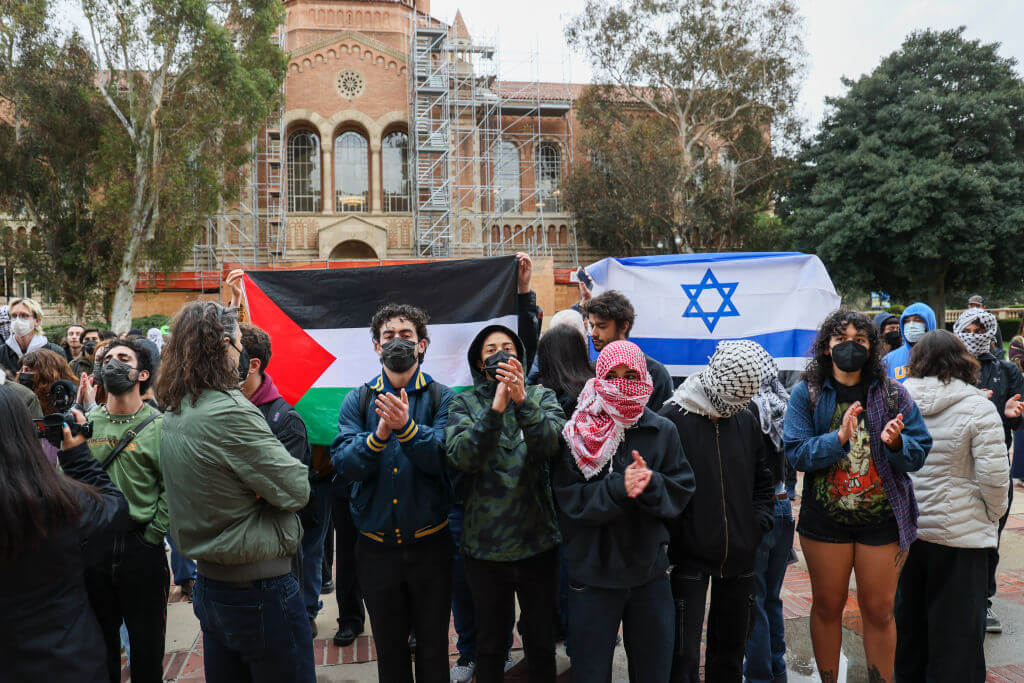What does the Star of David represent? A new ruling offers a legal answer
Judge Trevor McFadden argued targeting the Star of David is ‘as racially motivated’ as the n-word

Pro-Palestinian protesters attempt to block a counter-protester with an Israeli flag at UCLA in March. Photo by Juliana Yamada / Los Angeles Times via Getty Images
A federal judge has weighed in on whether an alleged attack involving the Israeli flag is antisemitic.
Judge Trevor McFadden, a Trump appointee, ruled Monday that targeting the Star of David on an Israeli flag is “racially motivated,” in a decision the plaintiff’s lawyers celebrated as clarifying under the law that antisemitic violence includes “attacks on Jews for supporting Israel.”
“The Star of David—emblazoned upon the Israeli flag—symbolizes the Jewish race,” McFadden wrote in his decision, adding that “targeting the Star of David is as racially motivated as the highly offensive racial slur, ‘n—.’”
The ruling is not the first time a judge has implied that Judaism is inseparable from Zionism. Last August, a federal judge issued a preliminary injunction ordering the University of California Los Angeles to provide equal access to Jewish students whose paths to classes were blocked by pro-Palestinian encampments that they couldn’t cross without being asked to denounce Zionism. The judge argued that the students being asked to disavow Israel was equivalent to being asked to “denounce their faith.”
But McFadden’s ruling is “the most strongly worded” opinion to date that suggests anti-Zionism might be considered a form of antisemitism, Matthew Mainen, a lawyer for the plaintiff, wrote in a statement.
“In the sense that it was so forceful, it was novel,” Mainen wrote. “We anticipate likeminded judges on this issue to look to Judge McFadden’s ruling as their lodestar in the coming years.”
McFadden’s ruling revolved around an incident last fall at a Code Pink protest for Palestinian rights in Washington, D.C. Kimmara Sumrall, a pro-Israel counterprotester, says Janine Ali, a pro-Palestinian protester, grabbed an Israeli flag that Sumrall was wearing tied around her neck, choking her.
Ali denies that she grabbed the flag, and she was found not guilty of assault in a criminal trial in May. Sumrall then filed a complaint seeking a civil stay-away order. Judge McFadden found Ali “likely committed the battery,” noting the lower standard of evidence in a civil case and testimony from a Capitol Police officer who witnessed the incident.
Frank Panopoulos, a lawyer for Ali, did not respond to the Forward’s request for comment.
In court, lawyers for Ali argued that “the Israeli flag represents the state of Israel rather than the Jewish race, so her action is merely anti-Israel, not antisemitic,” McFadden noted in his decision. Code Pink, in a statement, echoed that reasoning, writing “this false conflation seeks to criminalize political speech, even though many critics of Israel’s policies are themselves Jewish. It is an effort to erase the critical distinction between opposing a government’s actions and attacking a religion.”
But McFadden rejected that argument, writing that Ali had no reason to believe Sumrall was affiliated with the Israeli government.
“It is quite a stretch to say that yanking on a flag tied around someone’s neck is an objection to state policies,” McFadden wrote, citing Sumrall’s lawyers who argued that “if yanking on a flag emblazoned with the Star of David tied around a Jewish person’s neck at a pro-Israel protest is not discrimination, ‘I don’t know what is.’”
Mark Goldfeder, director of the National Jewish Advocacy Center, which represented Sumrall in court, called the ruling a “watershed moment.”
The ruling is “a crystal-clear example of moral clarity and common sense that should be followed by other courts everywhere,” he wrote. “Of course the Jewish star represents the Jewish race — it did so in Nazi Germany when our enemies forced us to wear it.”
McFadden granted the stay-away order against Ali, requiring that Ali not attempt to contact Sumrall and stay at least three yards away from her.
This article has been updated with a statement from Code Pink.













